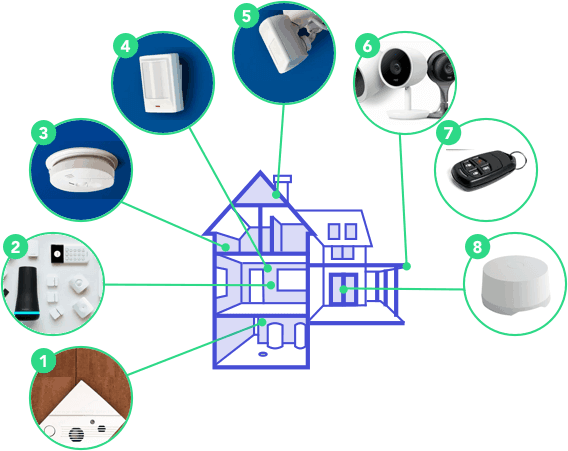

Rob Gabriele , Managing Editor & Home Security Expert Updated August 8, 2024 copied!

So, what’s a home security contract? In simple terms, it’s a handshake in writing between you and your home security provider. It outlines the details of what you can expect to receive from your home security service company and how much it costs. Essentially, it tells you every detail of your agreement with your home security provider.
Every home security contract will at least contain:
While these items will be in every home security contract, the specifics depend entirely on the type of security system and provider that you choose.

FYI: Here are our breakdowns of the contracts offered by the top three home security system providers:
At first glance, it might seem like home security contracts are excessive. But they serve a few key purposes.
Monitored systems are continuous services, so they require a monthly fee. This is where the contract, usually called a subscriber monitoring agreement, comes in. The contract gives you a clear idea of what to expect from your monitored security service, and it assures your provider that you’ll pay the monthly fee. It’s a straightforward way to ensure everyone has aligned expectations.
Contracts also help distribute the initial cost of expensive home security equipment like smart door locks and outdoor security cameras. Instead of a large upfront payment, home security contracts allow homeowners to make manageable monthly installments for their security equipment and installation. This approach makes home security more accessible to homeowners.
I won’t pretend that home security contracts are for your benefit only. Home security providers also benefit from them. They allow providers to use them as collateral for borrowing money and establishing lines of credit for growing their company.
A contract for a home security system can be as short as a year or stretch up to a whopping five years. But don’t let those numbers scare you! The industry standard is about 36 months.

But why does the length matter? Well, it directly affects your monthly payments since the cost of your equipment is spread over the length of the contract. In a nutshell, a longer contract typically means lower monthly fees.
Now, a long-term contract might seem like a big commitment — and it is — but it’s not all doom and gloom. Let’s break down the pros and cons to help you figure out if a long-term home security contract is right for you.
| Pros | Cons |
|---|---|
| Lower monthly payments: This is a biggie. The cost of your system is spread over a longer period, so your wallet feels a lighter pinch each month. | Penalties for canceling: If you decide to break up with your service provider before your contract ends, you’ll face a cancellation fee. |
| Free use of equipment: Most companies let you use their equipment for free during your contract. Not too shabby, eh? | Ownership of equipment: Here’s the thing: You usually don’t own the equipment that your service provider installs. So, if you don’t return it at the end of the contract, you have to pay for it. |
| No-cost repairs or replacements: If something goes wrong with your equipment, your provider usually steps in and fixes or replaces it for free. | Credit requirements: To get a long-term contract, you usually need to be a homeowner with a good credit rating. |
| Professional advice and installation: Some companies, like ADT and Vivint, even throw in a professional security consultation and installation. That’s expert advice and service for free. | Moving complications: If you move, you might need to sell your security contract with your house. There have been cases where customers have run into issues with this, so it’s definitely something to keep in mind. |
If the idea of a long-term contract makes you nervous, I have some good news. Companies like SimpliSafe changed the industry in 2006 by introducing month-to-month home security systems. Because there are no long-term commitments, you simply pay for your security monitoring service each month like you do with the rest of your subscriptions. Check out our hands-on review of SimpliSafe to learn more.
However, to use one of these no-contract security options, you usually need to pay for all equipment upfront.

Navigating home security system contracts can feel like a trek through a dense forest at night, but don’t worry, I’m about to give you a flashlight for your journey. So, let’s illuminate a few key components you need to look for when reviewing a home security system contract:
Although your provider might present your contract terms as set in stone, they are actually negotiable. Yes, you read that right. The standard contract your home security provider uses isn’t a rigid set of rules. Use it as a starting point for you and your provider to find mutually beneficial conditions.
Some parts of your home security contract were put in place after extensive legal analysis, so you’re unlikely to make much headway if you try to negotiate these aspects. However, here are a few key parts of your contract that you can negotiate:
Pro Tip: If you’re ready to close today, your salesperson will want to make the sale. Use this as a way to negotiate a better deal by telling them you’re ready to close if they meet your requirements.
Let’s face it, most of us aren’t great negotiators. We can’t all be Harvey Specter from “Suits.” In reality, most of us end up looking like Michael Scott from “The Office” when he’s selling the Michael Scott Paper Company. So, here are a few key tips you can use to negotiate more like Harvey Specter:
Canceling a home security contract is not always straightforward. The first place to look when you want to cancel is the contract itself. It should describe the exact cancellation process along with any fees you may incur.
Once you understand your obligations and rights under the contract, you can begin the cancellation process. Just remember, each security company has its own process, but you can still use these steps as a rough guideline.

Once you’ve got a handle on your contract, the first step to cancel any contract is communicating your intent. Typically, you send your service provider a cancellation letter that acts as your formal announcement to terminate the agreement. You can find free cancellation letter templates online, such as the ones offered by JotForm. 1
Some providers offer little opportunity for canceling their contracts. In these cases, transferring the contract is usually the easiest way for you to get out of it. If you’re moving, you might be able to sell your security contract with your home to avoid an early-termination fee.
Hitting a roadblock with your service provider? You might want to consider legal action if you think the company breached the contract. Bear in mind that this should be used only as a last resort, as it can be costly and time-consuming. Consult with a legal professional as soon as you start to consider this option.
Did You Know? You usually do not need a lawyer for small claims court, where a court of law can settle matters under a set dollar amount. The limit for small claims court ranges from $3,000 to $10,000 depending on the state.
Understanding your rights is crucial when dealing with cancellation policies and termination fees. Although you usually need to follow the cancellation process outlined in your contract, two specific laws in the U.S. might be able to help you get out of your contract.
The FTC’s Cooling Off Rule grants consumers the right to cancel certain contracts within three days of signing. 2 This provides a “cooling-off” period to protect consumers from high-pressure sales tactics. You can cancel your contract under this provision within three days if you signed up for your home security system through a door-to-door salesman or at a temporary location, like outside of Home Depot.
As of March 2023, the SCRA added specific provisions to help service members cancel home security contracts due to a Permanent Change of Station (PCS). 3 To use this protection, you need to submit a written notification of your intent to cancel along with a copy of your PCS orders. It applies to every National Guard working full time and reserve members along with any service member activated under Title 10.
Reading through a home security contract can make your eyes glaze over faster than a dozen donuts. But don’t sweat it! The key things to keep in mind are the cost breakdown, contract length, and your options if you want to cancel.
Once you understand your contract, you can confidently enter a partnership with a home security contract. As long as you’re on the same page about expectations and keep communication open, you’ll create a win-win situation. You get top-notch security for your home, and they get your business.
SafeHome.org only uses high-quality sources to support the facts within our articles. Read our editorial guidelines to learn more about how we fact-check and keep our content accurate, reliable, and trustworthy.

As a home security expert and Managing Editor for SafeHome.org, Rob Gabriele has written and edited over 1,000 articles related to home security. His expertise is in smart home protection with thousands of hours of testing and research under his belt. Formerly a reporter and producer for the USAToday network, Rob has been a writer and editor for over 10 years. He holds a Master’s of Science with an emphasis on writing from the University of Montana, and he currently lives in Indianapolis, IN.